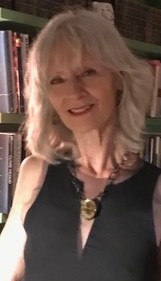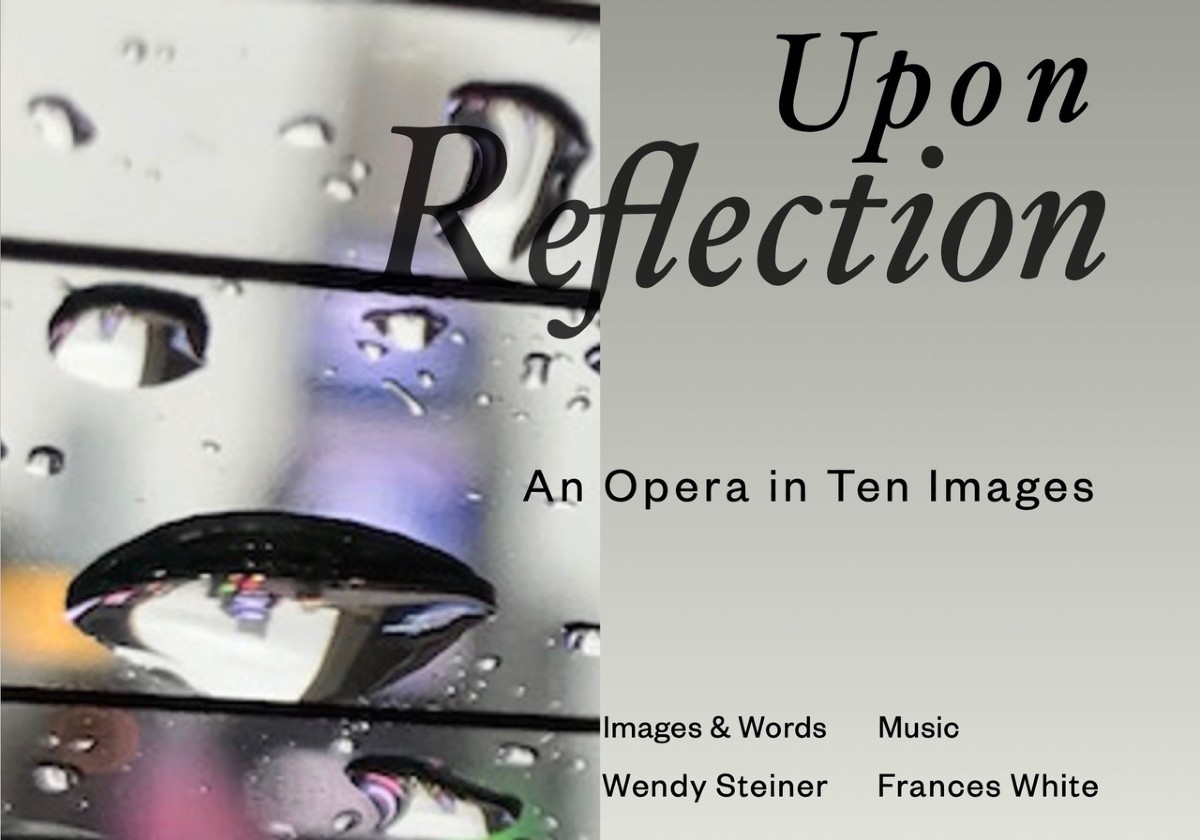February 29, 2024
Upon Reflection: An Opera in Ten Images
Music ~ Frances White
Words & Images ~ Wendy Steiner
 An interview between John Thiessen and Wendy Steiner
An interview between John Thiessen and Wendy Steiner
JOHN: Today we are joined by Wendy Steiner, co-creator and director of Upon Reflection: An Opera in Ten Images. It features soprano Sherezade Panthaki in a solo role accompanied by early music ensemble Parthenia, performing composer Frances White’s original musical score. Dr. Steiner is a scholar, cultural critic and public intellectual, who, in addition to being a librettist and photographer, has received awards from the Guggenheim Foundation, the American Council of Learned Societies, Bellagio, the NY State Council for the Arts, and the National Endowment for the Humanities. As the Richard L. Fisher Professor of English at the University of Pennsylvania, she taught and has published on aesthetics and art, and has written for The New York Times, London Independent, Guardian, LA Times, London Review of Books, and The Times Literary Supplement. Her latest book, The Beauty of Choice: On Women, Art and Freedom will come out this June from Columbia University Press. Welcome, Wendy.
WENDY: My pleasure, John.
 JOHN: It has been a delight to be on this journey with you, preparing for performances of Upon Reflection on May 4th at 7:30 pm and May 5th at 3:00 pm at New York’s DiMenna Center for Classical Music, 407 West 37th Street at 10th Avenue. As your fiscal sponsor, GEMS has been behind-the-scenes, helping with venue arrangements, artist contracts, tickets sales, marketing, and planning on-site services. But the creative side is wholly your collaborators' and yours. Let’s begin by having you explain the origins of Upon Reflection: An Opera in Ten Images. How did it come to be, what is it about, and why did you choose Sherezade and Parthenia as your performers?
JOHN: It has been a delight to be on this journey with you, preparing for performances of Upon Reflection on May 4th at 7:30 pm and May 5th at 3:00 pm at New York’s DiMenna Center for Classical Music, 407 West 37th Street at 10th Avenue. As your fiscal sponsor, GEMS has been behind-the-scenes, helping with venue arrangements, artist contracts, tickets sales, marketing, and planning on-site services. But the creative side is wholly your collaborators' and yours. Let’s begin by having you explain the origins of Upon Reflection: An Opera in Ten Images. How did it come to be, what is it about, and why did you choose Sherezade and Parthenia as your performers?
WENDY: The germ for this opera was a performance of Schubert’s Winterreise I saw at Alice Tully Hall in 2014. The artist William Kentridge had fused excerpts of his previous work into multi-screen projections, making no attempt to illustrate Schubert’s song cycle. I found the result revelatory: a contemporary artist and a romantic artist were in a sort of conversation that placed their differences and similarities in high relief. Ultimately, I realized, that is what we all do when we experience art. We bring ourselves to it and attempt to see ourselves in it, and sometimes, if the mirror is true, we come to recognize something profound.
A few years after the concert, in 2019, I presented a “digital music visualization” called Traces on the Farther Side at the Venice Biennale. Co-designer Andrew Lucia and I transformed Parthenia’s performance of Frances White’s ethereal music, note by note, into sprays of colored pixels that accumulated on a screen like a pictorial meditation. When I was taking the piece down that November, it happened that Parthenia was presenting a concert with soprano Sherezade Panthaki in the Venetian church of Santa Maria delle Penitenti. The combination of Sherry’s ravishing voice and the viols sounding in that evocative setting was so exquisite that, back in the States, I asked Frances whether, if we ever wrote an opera together, it could be created for these artists. And that is just what we did — all through the Covid pandemic.
The libretto grew out of ten photographs I had taken, all of them showing reflections in glass or water. I imagined them as the work of a young photographer who was giving an artist’s talk to the guests at her show. She would begin with an image shot inside a taxi in Times Square when she was on her way home from a performance of Schubert’s Winterreise. She had been crying in the taxi. Schubert was dying when he finished this work, and he had been just her age, thirty-one. The program said “the rosiness of life had left him.” Channeling Schubert’s desolation through his music, the photographer had felt her own rosiness gone as well, though she was not dying. As a woman, she had been trained to keep herself out of her work to avoid appearing “too feminine”. She was thus blocking the very empathy that had made Winterreise so valuable an experience for her, and “upon reflection,” she had decided not to do that anymore. So now at the gallery, she invites her guests to find her in her photographs, hoping that their shared vision will restore not only her “rosiness,” but theirs.
JOHN: Reflecting upon art from a different age as the stepping point for a new creative work — in this case restoring the “rosiness” that Schubert had made her realize she’d lost — seems a very powerful and hopeful response. Reflection is fundamental to your opera, but also in a wider sense, to your own creative writing and cultural criticism. How do you understand reflection influencing your work, as well as the life of your opera character?
WENDY: In my writing on art, I present beauty not as a thing or a definable property of things, but as a special interaction that a person can have with almost anything. This interaction carries a deep and often unexpected pleasure, and at the same time an awareness of ourselves experiencing that pleasure. Something has moved us, and as we see ourselves liking or even loving it, we note, too, that we have it in us to appreciate such a thing. That capacity is our beauty. With art, we also compare our pleasure — our taste — to that of other people who respond to the work. Art opens the possibility of communication, sharing, and empathy — or not, as the case may be. The cumulative back-and-forth that occurs among ourselves, the artwork, the artist, and others who discuss the work, write about it, perform and adapt it is like a hall of mirrors — a vast, constantly changing, wonky set of reflections. That is what culture is. Upon Reflection depicts it through an artist inviting her viewers to join in the interchange, as well as through the reflections in the photographs and the interplay of live, pre-recorded, and digital sound in Frances White’s music.
JOHN: In the field of early music, we do these things, unearthing forgotten manuscript scores, using instruments known to the composers, and learning instrumental and vocal techniques appropriate to the period. And there is a constant interaction with beauty, because in most cases, it is what has drawn us to a particular repertoire. In performance, we are guided by our research as well as our artistic awareness and sensibilities, which in turn create occasions for dialogue with our audience. In the case of Upon Reflection, what can we learn from your intentional choice of using a consort of viols and recorders?
WENDY: Frances chose to score the piece for early instruments, and given my long involvement with Parthenia and with recorders, I couldn’t have been happier. Early music often strikes me as very modern. Every experience of art involves a time lag between creator and audience, even when they are contemporaries. But the possibility of connecting with a sensibility distant from our own is all but irresistible. It extends our scope as embodied beings and fosters our imaginative suppleness toward each other. In Upon Reflection, the sounds of instruments played more than 600 years ago infuse romantic and contemporary musical idioms and digital fabrications. John, you told me about the viol consort from Montréal called Les Voix Humaines and in this opera we have another group of viol “singers” conversing with the breath-rich tones of recorders and the strains of an exquisite soprano. Frances' shakuhachi intervals echo with bel canto, Schubert, lapping water, and cocktail chatter in spatio-temporal leaps worthy of a superhero. And yet we see the connections — and hopefully, find them beautiful — each in our own way.
JOHN: You connect the old and the new, both musically and philosophically, in so many inspiring ways. But now, back to the immediate present! You are nine weeks away from the May 4–5 production of Upon Reflection at the DiMenna Center. Could you give us a sense of the timeline for final preparations?
WENDY: Sherezade Panthaki and Parthenia finished the pre-recordings last month, and Frances is now editing and mixing the files with our sound engineer, Bill Siegmund. Once these are final, videographer (and lutenist) Ryan Closs and I will create a projection track of animated photographs and surtitles. By April, this track should be complete, at which point Ryan and Frances will create a “digital script” for the performance, a plan for activating the pre-recorded sound and imagery during the live opera. Meanwhile, the soprano and instrumentalists will be rehearsing; I’ll be working out the blocking for Ms. Panthaki; and GEMS and publicist Kieran Walsh will be getting the word out to what we hope will be packed audiences at the DiMenna Center. To say that operas are three-ring circuses is an understatement.
JOHN: What an amazing mix of pre-recording and live performance elements. Pray the power doesn’t go out! Now, given the multiple musical and visual components in Upon Reflection, do you foresee a film version of the work which could be enjoyed by a much wider audience?
WENDY: Yes, a film is part of the plan. I have engaged a videographer and a sound engineer to tape the May 5th performance of Upon Reflection. Their recordings will be only raw footage for the eventual film, since the opera is permeated with pre-recorded sound and imagery that cannot be properly captured from a live performance. The editing will splice in these elements, in a process that will be complicated and, I suspect, costly.
JOHN: Productions like Upon Reflection are expensive, and of course dependent on financial support in addition to ticket sales. How can the GEMS community support your project and partner with you to sponsor further local performances, eventual tours, and the film version?
WENDY: So far, Upon Reflection has been a labor of love, but sadly, even love has limits. I would be tremendously grateful if the New York music community could support this project by donating on the GEMS website.
JOHN: Wendy, I know that many will want to support Upon Reflection and we wish you much success in May and beyond!
WENDY: Thank you so much, John, and thanks to everyone at GEMS. I look forward to seeing you at the show!



